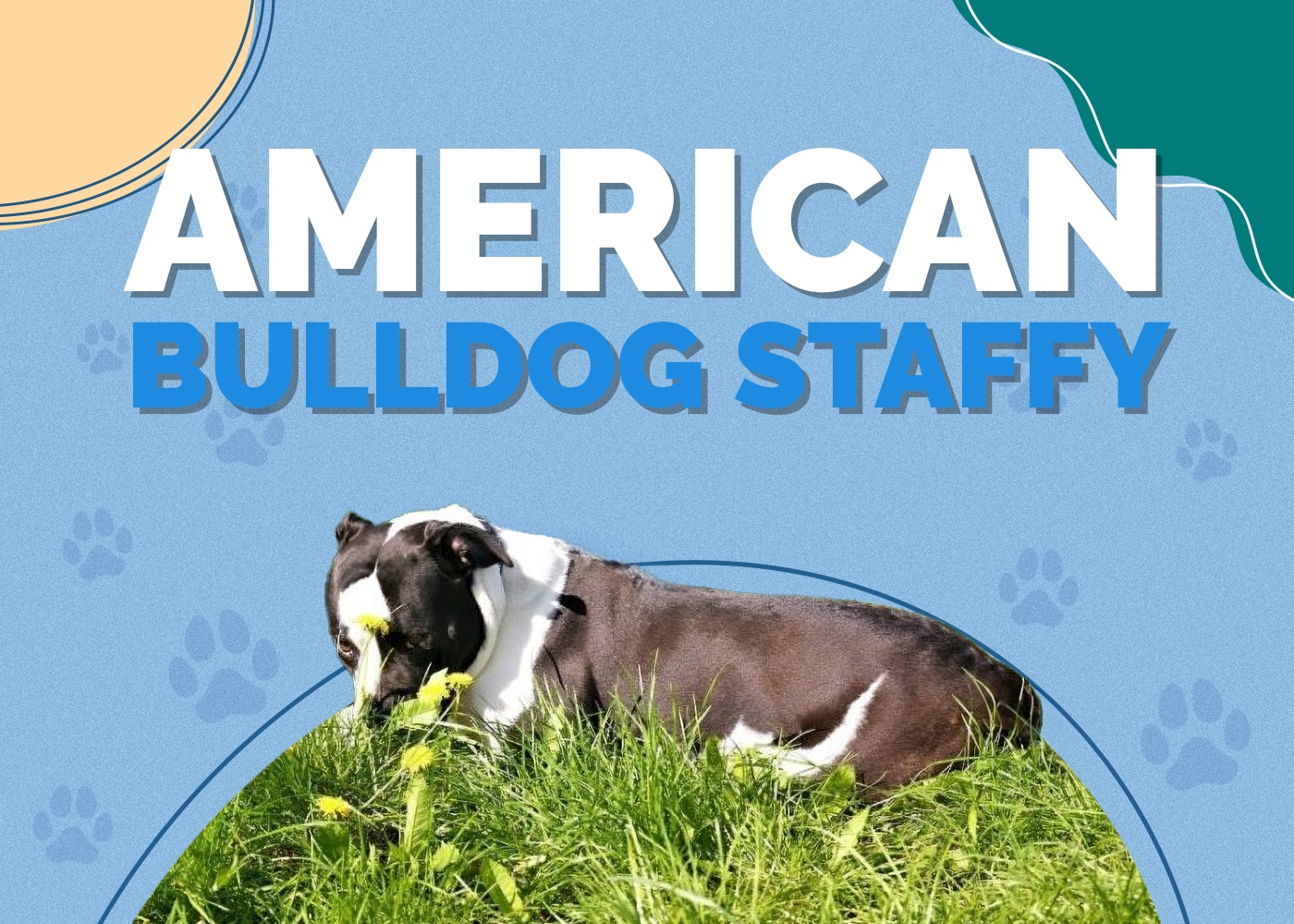Samoyed Breed Info: Pics, Puppies, Interesting Facts, Traits

Updated on
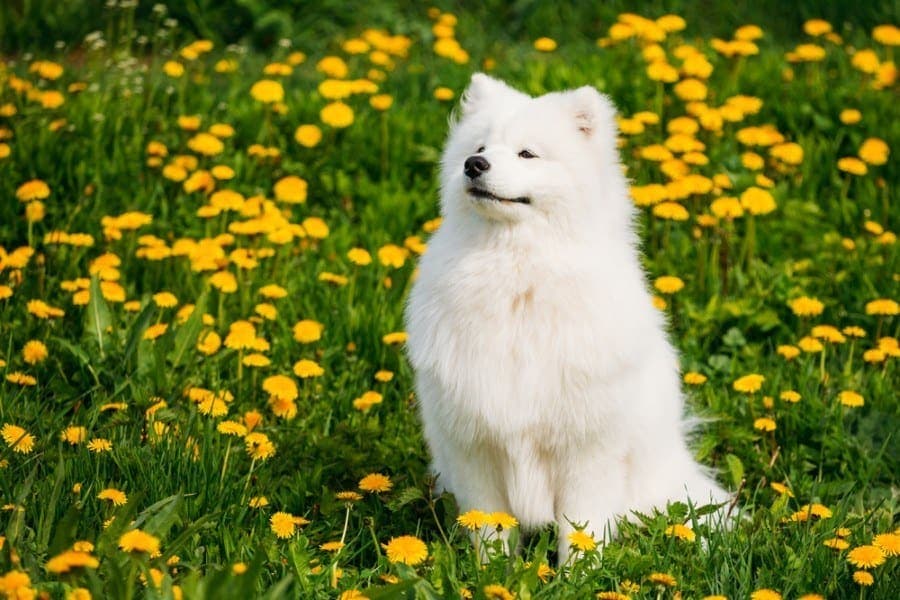
| Height: | 19–24 inches |
| Weight: | 50–60 pounds |
| Lifespan: | 12–14 years |
| Colors: | White, cream, biscuit |
| Suitable for: | Active families, those looking for a low-shedding dog |
| Temperament: | Intelligent, social, active, and friendly |
The Samoyed takes its name from the nomadic Samoyedic people of Siberia, who bred them to herd reindeer and pull sleds in some of the coldest conditions on Earth. In a land where temperatures of -60 degrees Fahrenheit are common, the Samoyedic lived in tents and slept huddled together with their dogs for warmth.
The Samoyed is a medium-sized dog with a face that looks like it is always smiling. The breed is best known for its snow-white coat, but they can be white, cream, biscuit, or a combination of any of these colors. They have a friendly disposition and love nothing more than spending time with their human families.
 Samoyed Puppies
Samoyed Puppies
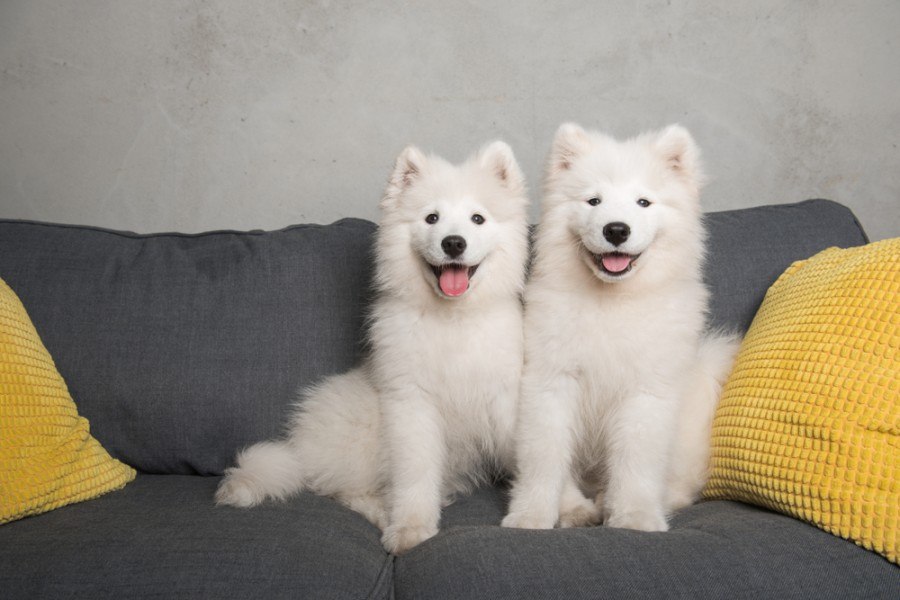
As you might expect, the Samoyed’s thick, luxurious coat is something that requires a significant amount of care and attention. Without regular brushing, their coats will quickly become tangled and matted, so before diving in and buying a Samoyed, you should consider whether you have the time to meet their grooming needs.
Potential owners should also keep in mind that the Samoyed does not like being left alone for long periods. They need the company of their human family, as a Samoyed that is left alone too long will quickly become destructive and may also develop a problematic howling habit.
Another important consideration is space. While the Samoyed is not a large dog, they are big furry bundles of energy. They love to run about and play, tendencies that will continue into their old age, and as such, they are not the best dogs to keep in an apartment. You should also remember that these dogs were bred for the cold and do not do well in hot or tropical climates.
3 Little-Known Facts About the Samoyed
1. Despite their grooming requirements, Samoyeds make great dogs for first-time owners
Samoyeds form a strong bond with their family and quickly learn the family hierarchy. Unlike some dogs, they are not overly dominant and provided that they are appropriately trained and socialized while young, they will happily follow instructions for all family members.
While Samoyeds love nothing more than spending time with their families, they are not the sort of dog that requires constant attention. They are happy enough just being with you and will follow you from room to room or task to task as you go about your day.
2. It’s not the Samoyed’s strength that made them good sled dogs
When it comes to pure pulling power, dogs such as the Siberian Husky make far better sled dogs than Samoyeds. Yet, despite being weaker and unable to pull as much weight, the Samoyed is often preferred for its superior ability to navigate through difficult and rough terrains that slow other dogs down.
It was for this reason that in 1911 Roald Amundsen chose a Samoyed to lead his dog team and thus became the first dog to reach the South Pole.
3. Samoyeds don’t make good guard dogs
Despite their loyalty and devotion to their human family, the Samoyed is not a particularly good guard dog. They are far more likely to greet an intruder than to challenge them in any way.
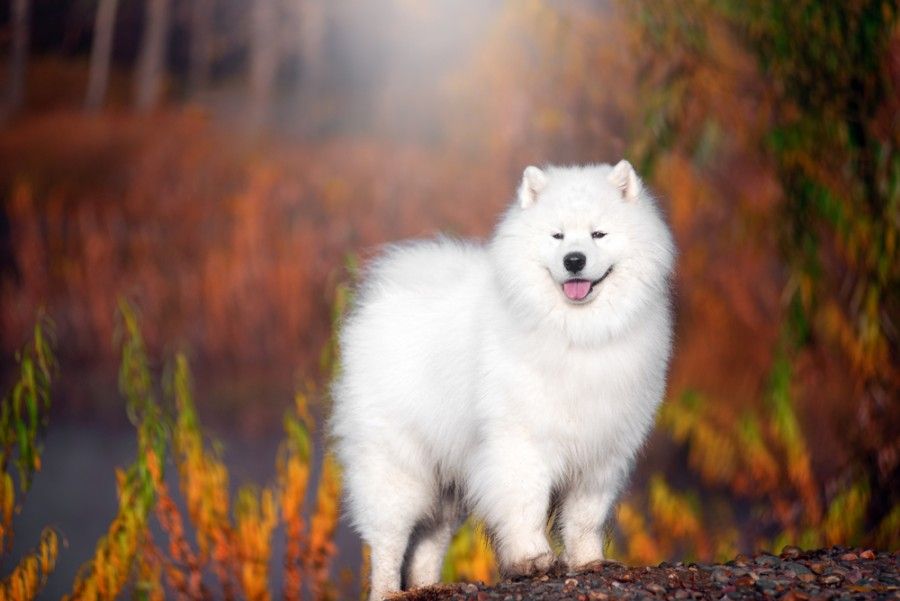
Temperament & Intelligence of the Samoyed 🧠
The Samoyed is an intelligent and extremely friendly dog. They make friends with everybody and are almost completely trusting of humans. They are also vigorous and playful dogs that have bundles of energy and love outdoor exercise and play, particularly in the cold weather.
Are These Dogs Good for Families? 🏡
Yes, the Samoyed is a fantastic dog for a family. They get on well with all family members and are great with children. However, you may need to keep a close eye on them around babies and toddlers, as they are quite excitable dogs that love to bound around and may inadvertently knock over or injure a small child.
Samoyeds want to be part of everything you do and are the sort of dog that will happily go with you to the park, tag along to children’s sporting matches, or even follow you around the house while you do your daily chores. They genuinely love their families and will want to do everything with them.
Does This Breed Get Along with Other Pets? 🐶 😽
Unfortunately, there is no easy answer here. Samoyeds do have quite a strong prey drive and as such, tend to chase after other animals, particularly small pets, such as cats, rabbits, and hamsters.
If socialized while young and raised with other pets, you are unlikely to have too many issues. Ideally, when considering an adult dog, you should let the breeder know what other pets you already have and check with them to see if the dog is suitable for that environment.
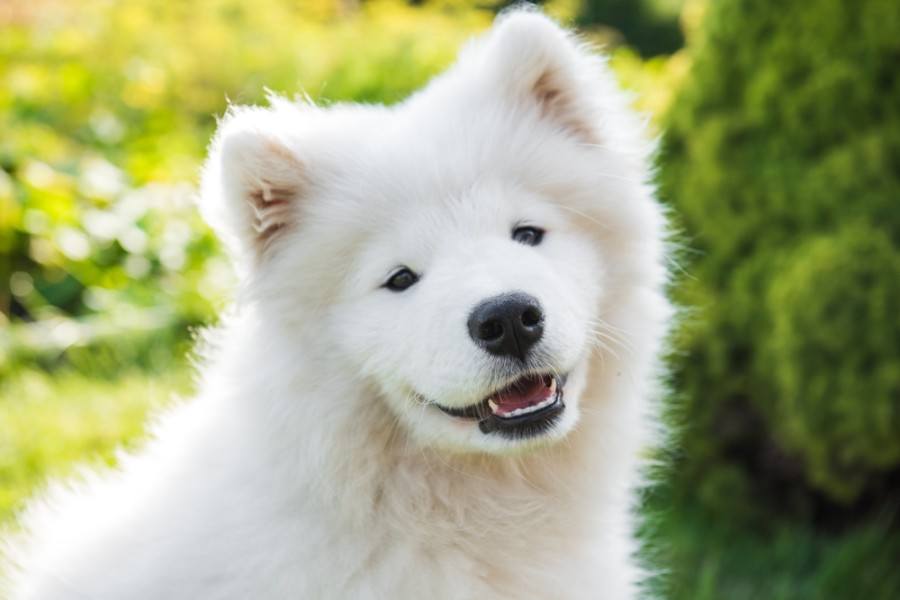
 Things to Know When Owning a Samoyed
Things to Know When Owning a Samoyed
For medium-sized dogs, Samoyeds have a great deal of energy. They love outdoor play and exercise and need to get out for a good run every day.
Samoyeds will typically enjoy sleeping inside near their family but can also sleep outside provided that they have somewhere warm and dry to curl up. Just keep in mind that if they feel that they are being left alone for too long, they may voice their displeasure with a whiny howl or bark.
Barking can become a real problem with Samoyeds, so it is important to find a solution early, which is also why you must give genuine consideration as to whether you have enough time to spend with a Samoyed before you get one as a pet.
Food & Diet Requirements 🦴
Dogs, like humans, are individuals, and exactly how much food your Samoyed needs to eat will depend on their age, size, and activity level. Even highly active breeds like the Samoyed will vary from dog to dog in their amount of activity and hence, the amount of food that they need to eat.
When it comes to choosing the right food for Samoyed, we recommend that you select a premium brand of high-quality dry dog food that will provide your pet with a nutritious and well-balanced meal, ideally containing a mix of meat, grains, and vegetables.
For a puppy, you may want to start with a dog food like Food. Of course, there are many other brands of food available. It is always advisable to find one that provides a range of different foods to meet your dog’s nutritional requirements, whatever their stage of life.
Exercise 🐕
Samoyeds are highly active dogs that need a considerable amount of exercise. For this reason, they are not ideal dogs for apartment living, but rather they will do best in a home with a large, secure yard in which they can run around and play.
Samoyeds are born and bred for the cold weather, so don’t be surprised to learn that in even the snowiest of winter days, your Samoyed will want to go out and play. They love the cold and to play in the snow.
Conversely, if you live in a warmer climate, you will likely find that your Samoyed will only want to go out and play early in the morning or late at night when the day is at its coolest. Samoyeds can live quite happily in mild climates but do not enjoy a hot or tropical environment.
At the very least, you should walk your Samoyed daily and ideally, twice a day. When out in public, it is a good idea to keep your Samoyed on a leash, as they do have quite a strong prey drive and may be inclined to chase after birds or other small animals.
Training 🦮
Training a Samoyed can be both fun and rewarding, with your dog genuinely enjoying the time that you’re spending with them. With their history as working dogs, Samoyeds are intelligent and will respond well to directions. They can, however, tire of repetitive tasks, so you should make an effort to keep their training session fresh and full of fun and positive reinforcement.
We recommend starting with a puppy preschool when your dog is about 8–12 weeks of age. At this stage, your Samoyed’s lesson will only be quite basic. But they will spend time with other dogs, which is an important part of their early socialization.
At about 6 months of age, your Samoyed can progress to adolescent dog training. By this time, you and your dog should have basic obedience training mastered. If you find your dog genuinely enjoys their training, you may want to consider moving on to higher-level obedience or even agility training.
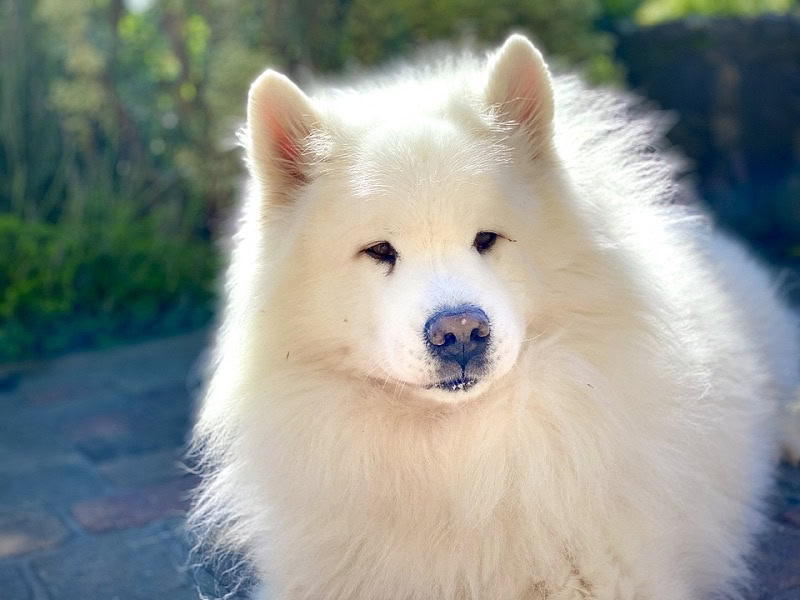
Grooming ✂️
The Samoyed’s thick, dense double-layered coat does a fantastic job of keeping them warm and dry in even the harshest of weather conditions. But, as with all double-coated dogs, each year at the beginning of summer and again at the start of winter, a Samoyed will “blow their coat,” a process where they switch from their summer coat to their winter coat and vice versa.
When a Samoyed blows its coat, the undercoat sheds spectacularly and will require many hours of brushing with a stripping comb, or the services of a professional dog groomer, to strip it out.
For most of the year, however, a quick brush every day or two is enough to keep a Samoyed’s coat free of tangles and looking good. The breed doesn’t need much bathing and only tends to smell when they are not well or their undercoat is left wet. For this reason, it is important to ensure that when you do bathe them, you dry their coat thoroughly.
Health and Conditions ❤️
Samoyeds are hardy and robust dogs that were bred to survive in some of the harshest weather conditions on the planet. Only the fittest of dogs survived long enough to reproduce, and as a result, Samoyeds do not suffer from many of the common hereditary problems seen in other Northern dog breeds.
Certain hereditary problems, such as hip dysplasia, can still be issues; however, through careful breeding programs, it is possible to reduce the incidence of these.
As with all dogs, there are a number of health conditions that Samoyeds can be susceptible to.
- Eye infections
- Ear Infections
- Patellar luxation
- Cataracts
- Diabetes
- Glaucoma
- Hip dysplasia
- Hereditary glomerulopathy
- Patellar luxation
- Cancer
- Hypothyroidism

Male vs. Female
Male Samoyeds are both taller and heavier than females and tend to be more energetic and playful. For this reason, families with young children may be better off getting a female Samoyed. In contrast, a male Samoyed may be more suited to the rough-and-tumble lifestyle of older children or teens.
You may also find that a female Samoyed is easier to housebreak and train and will bond more closely with their owners. However, they can also be more demanding and less able to cope with time alone.
 Final Thoughts
Final Thoughts
Samoyeds are fantastic dogs. Friendly, outgoing, playful, and aesthetically beautiful, they make great pets and excellent companions for both families and individuals. They do require a bit of care when it comes to grooming and exercise, but other than that, they are quite easy dogs to own and make a good choice for both experienced and first-time dog owners.
If you think that a Samoyed might be the right pet for you, we recommend that you get in touch with the Samoyed Club of America. They will be able to give you information on registered breeders in your area, the availability of both puppies and adult dogs, and details of dog shows that you can attend to see the breed and speak with breeders.
See also:
Featured Image Credit: Grisha Bruev, Shutterstock
 Samoyed Puppies
Samoyed Puppies
 Things to Know When Owning a Samoyed
Things to Know When Owning a Samoyed Final Thoughts
Final Thoughts

